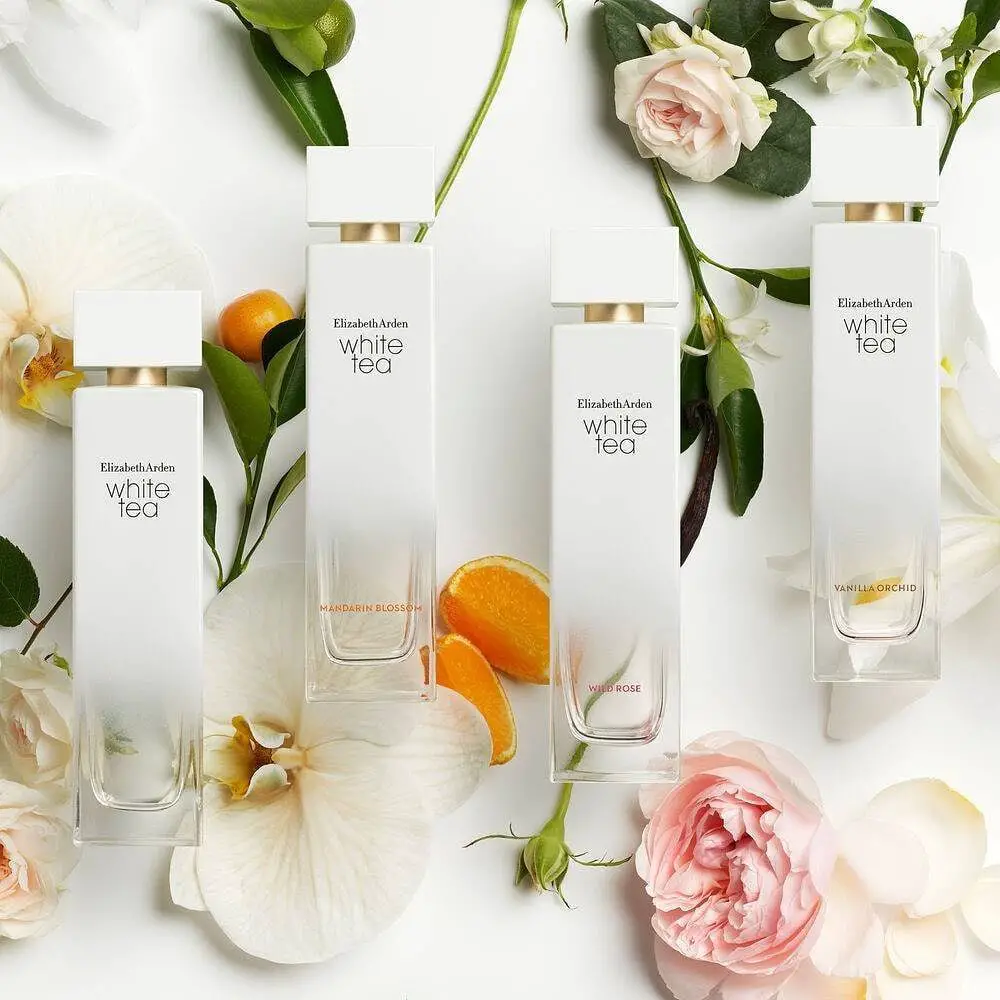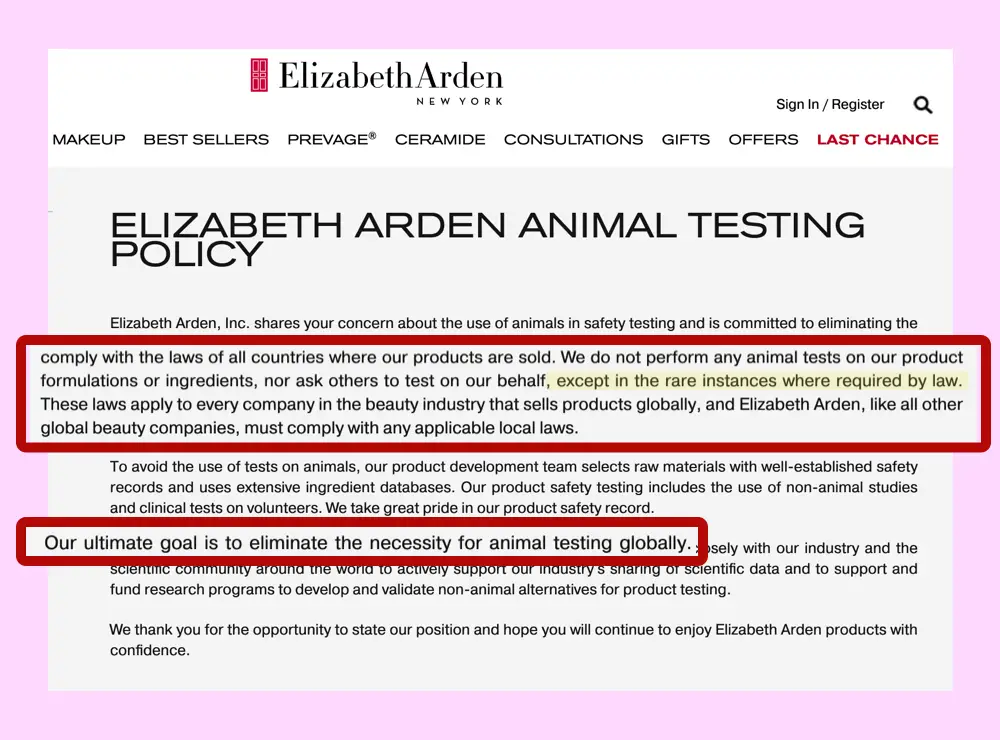Elizabeth Arden has been part of beauty regimes for over a century. It has a trusted legacy that appeals to all generations. But beauty has changed since 1910 – has the brand updated its cruelty-free and vegan policies to match?
Elizabeth Arden is not cruelty-free. It distributes its cosmetics where animal testing is required by law. While Elizabeth Arden has products free of animal-derived ingredients, it is not considered a vegan brand.
Elizabeth Arden is a household beauty name that’s been around since 1910. The brand launched on 5th Avenue, NY, offering skincare, cosmetics, and fragrance.
Elizabeth Arden is unique because it’s survived multiple wars and depressions by anticipating what women want.
Red lipstick for suffragettes', travel-sized products for the jet-setter, demonstrations, and ingredients innovations are some of those trends forecast by Elizabeth Arden.
It shouldn’t surprise you that at one point, Miss Arden was the wealthiest woman in America.
It was only in 2016 that Revlon bought out the rest of Elizabeth Arden’s shares for about $870 million in total… wow.
But we’re not sure Elizabeth Arden is doing the best job anticipating what the modern woman wants from her beauty regimen anymore – here’s why.Is Elizabeth Arden Cruelty-Free and Vegan?
Elizabeth Arden is NOT Cruelty-Free
It does not:
However, it does:
Unfortunately, this household beauty name is not cruelty-free because it distributes its products to Mainland China.
Elizabeth Arden also claims not to purchase ingredients tested on animals within its supply chain. Still, without a third party to confirm this, we can’t know for sure if it’s true.
Finally, the brand is largely owned by Revlon – which is not a cruelty-free company.
This brings us to the next point:
Elizabeth Arden is Not Vegan
Although Elizabeth Arden may have vegetarian and vegan products, it’s hard to consider any of them as “vegan” because it’s not 100% cruelty-free.
Does it have products that are free of animal-derived ingredients? Maybe (we can't see).
Could these products considered holistically vegan? Not in our opinion.
What’s also frustrating is that searching for vegan products on its website brings up nothing. It does not advertise or help customers find products free of animal-derived ingredients.
Some of the animal-derived ingredients it uses include:
If you're interested in which products are vegan or finding vegan brand alternatives – keep reading or click on this link: Elizabeth Arden vegan products.
Animal Testing Policy and History
Elizabeth Arden has been clear that it only conducts animal testing when required by law and ships to countries like China. However, they still have a stance on cruelty-free cosmetics.
And it’s a tricky one to agree with…
Cruelty-Free Status in 2022
Here is a screenshot of Elizabeth Arden’s lengthily official statement regarding its cruelty-free policies and vegan products, taken from its website:
We find its statement problematic and misleading. Here’s why:
Certification
Elizabeth Arden has no cruelty-free certification. Although it would be nice to see some – it cannot happen as long as the brand continues its current animal-testing policies.
No cruelty-free organization would promote a product that distributes its products to any country that requires animal testing by law.
If a brand wants to receive the ultimate, globally recognized certification from Leaping Bunny, they need to adhere to the following strict criteria:
If you see a bunny stamp on the back of your product bottle – that's an excellent sign. But don't let the image itself fool you. A lot of brands are using fake logos to deceive consumers.
Do your homework and see which products are genuinely cruelty-free first. This article will help you: Which Cruelty-Free Logos Can You Trust?
Is Elizabeth Arden Sold Where Animal Testing is Required By Law?
Elizabeth Arden distributes its products in China, where animal testing on cosmetics is required as products arrive at the border.
China has a shocking track record. It is the country with the most animal testing globally, with over 20 million animals used per year.
However, if you live in China or are concerned about its cruel beauty policies, there are a couple of loopholes.
Here's how to find cruelty-free cosmetics in China: Are Cosmetics Made in China Cruelty-Free?
What Elizabeth Arden Products Are Vegan?
We don't consider Elizabeth Arden's vegan products holistically vegan because the brand is not 100% cruelty-free.
It does have some products that are free of animal-derived ingredients. But the biggest issue is that none of its products are clearly labeled.
Unfortunately, Elizabeth Arden does not mention any vegan products when searching online, either.
We can share that the brand’s famous ceramide capsules are vegetable-based and biodegradable. #smallwins
You can email customer service to receive specific information if you’d like to know more about a product.
Vegan Alternatives to Elizabeth Arden
Elizabeth Arden is not a brand for vegans, animal activists, or environmental advocates. It doesn’t embrace the modern qualities we’re looking for in a progressive beauty brand.
Luckily, there are many alternative vegan brands out there that are certified cruelty-free and available globally. (Yes, that’s a dig at Elizabeth Arden’s ‘global brand’ blanket statement.)
Here are some luxury brands within the same price range that are 100% vegan and cruelty-free:
Are you looking for cruelty-free and vegan substitutions for some of Elizabeth Arden’s time-honored best sellers? We can help you with that too:
Elizabeth Arden | Vegan Alternative |
|---|---|
8-hour cream | Skin Proud Everything Balm |
Advanced Ceramide Capsules | Pacifica Vegan Ceramide Face Serum |
Red Door Perfume | Le Labo Rose 31 |
Flawless Finish Foundation | Pressed Mineral Foundation |
Is Elizabeth Arden Natural and Organic?
Elizabeth Arden is not considered a natural or organic brand. However, it does claim to make safe and simple formulas with as many natural ingredients as possible.
Clean vs. Natural Ingredients
The term "natural" is not regulated for cosmetics and skincare. In other words, it doesn't hold one specific meaning.
Usually, it means a product is free of certain more toxic synthetic ingredients, including parabens, phthalates, sulfates, and more. But people also interpret "natural" to mean ingredients of immediate plant origin.
Here's the thing: "natural" is not necessarily good. Just because an ingredient is natural (take olive oil, for example) doesn't mean you should rub it on your skin and sit in the sun to fry yourself like a chicken breast!
All products use a certain amount of synthetic ingredients in their formulas. Elizabeth Arden is no exception – but it does choose to use better or clean synthetics.
If a synthetic ingredient is "clean," it means it is safe and non-toxic for us. Its purpose is to preserve the stability of a beauty formulation.
A few naturally-derived ingredients Elizabeth Arden uses to enhance its cosmetics include:
Does Elizabeth Arden Use Safe Ingredients?
According to Skin Safe, Elizabeth Arden has an 82- 100% allergen-free ranking across 65 products.
Many of Elizabeth Arden’s products are free of allergens such as parabens, fragrance, gluten, coconut, lanolin, soy, nickel, Propylene glycol, and dyes.
Reading the ingredient list is crucial because Elizabeth Arden is not 100% hypoallergenic or non-comedogenic, and they do not claim to be.
The EU/UK Have Stricter Ingredient Regulations
We don’t want to scare you, but you HAVE to read up on any product’s ingredient list before you make a purchase – especially if you live within the United States. The reason why will shock you.
The FDA has only banned or restricted 11 harmful chemicals from cosmetics within the country. Europe and the UK, on the other hand, have banned 1,328!
While Elizabeth Arden is relatively safe, it does use a surprising amount of preservatives and chemicals in its products that you may not be happy about.
Always check your product label to avoid the following ingredients:
Are Cruelty-Free Ingredients Safe?
If you’re worried about how safe it is to use cosmetics not tested on animals – please relax and take a sigh of relief.
There is no reason why cruelty-free products shouldn’t be as safe as anything tested on animals.
Not only is it easy to test ingredients without using animals altogether, but there are so many pre-approved ingredients you can use to make cosmetics that there is no need.
If you’re interested, here’s more on the subject: Are Cruelty-Free Cosmetics Safe?
Is Elizabeth Arden Sustainable and Ethical?
Elizabeth Arden claims to be highly aware of its responsibility to environmental and social causes.
The brand states that it focuses on two areas:
Unfortunately, Elizabeth Arden doesn’t expand much on how they are making it happen or what projects they’re currently involved in.
For a multi-million-dollar brand with a long history – it’s a poor show.
It's no secret that the world has a huge waste problem, and cosmetic brands only make it worse by using unsustainable packaging and harmful ingredients.
Elizabeth Arden claims to support initiatives that reduce their overall environmental footprint.
The brand says that it aims to target “reducing, reusing and recycling materials in our production and maximizing efficiencies in our distribution methods.”
How?
We have no clue because they share nothing about implementing this strategy.
(Pause to raise an eyebrow.)
Some of the ways Elizabeth Arden could take strong environmental accountability are:
Final Thoughts
Elizabeth Arden has been around for over a century and yet, takes nearly no ethical factors into consideration. It lacks a transparent supply chain or any details about eco-efforts too.
Elizabeth Arden is not a cruelty-free brand. As much as they claim to be actively against animal testing, they choose to distribute to China, which is a direct conflict of interest.
We aren’t able to find any vegan products from Elizabeth Arden. Even if we could, we cannot consider its products free of animal-derived ingredients as holistically vegan.
We hope to see a change in this issue, but it is unlikely right now.
As consumers, it is up to us to stand for what we will and won't accept from our cosmetics. This is something we cannot accept.


